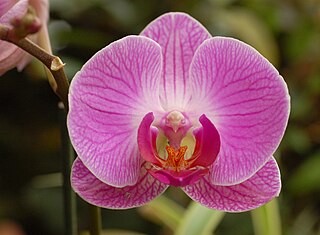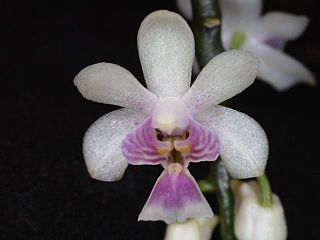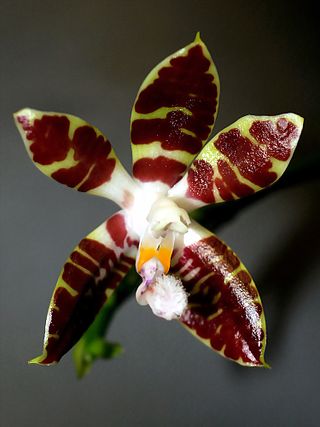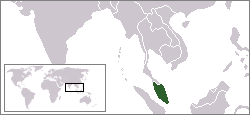
Vanda, abbreviated in the horticultural trade as V., is a genus in the orchid family, Orchidaceae. There are 90 species, and the genus is commonly cultivated for the marketplace. This genus and its allies are considered to be among the most specifically adapted of all orchids within the Orchidaceae. The genus is highly prized in horticulture for its showy, fragrant, long-lasting, and intensely colorful flowers. Vanda species are widespread across East Asia, Southeast Asia, and New Guinea, with a few species extending into Queensland and some of the islands of the western Pacific.

Phalaenopsis, also known as moth orchids, is a genus of about seventy species of plants in the family Orchidaceae. Orchids in this genus are monopodial epiphytes or lithophytes with long, coarse roots, short, leafy stems and long-lasting, flat flowers arranged in a flowering stem that often branches near the end. Orchids in this genus are native to India, Taiwan, China, Southeast Asia, New Guinea and Australia with the majority in Indonesia and the Philippines.

The ornamental orchid species Phalaenopsis hieroglyphica is native to certain islands of the Philippines. Its flowers are creamy white with transverse markings that resemble glyphs. Through hybridization, growers have successfully created flowers with different shapes and colors while retaining the glyphs. Since 1975, the species has been protected under Appendix II of the Convention on International Trade in Endangered Species of Wild Fauna and Flora (CITES).

Phalaenopsis stobartiana, also known as 滇西蝴蝶兰 in Chinese, is a species of epiphytic plant in the family Orchidaceae. It is endemic to Hainan, China. The specific epithet stobartiana refers to William Culley Stobart. The Stobart family were the principal landowners and colliery owners in the 19th century in England.

Phalaenopsis equestris is a flowering plant of the orchid genus Phalaenopsis and native to Philippines and Taiwan. The inflorescence has 10 to 20 flowers of about 25 mm (1 in) diameter.

× Doritaenopsis was a genus of artificial hybrids first formally described in 1935 by André Guillaumin in the Archives du Muséum national d'histoire naturelle.

Phalaenopsis bellina is an orchid endemic to Borneo. It is one of 75 species of Phalaenopsis and one of the most commonly cultivated species in the genus.

Phalaenopsis deliciosa is a species of orchid occurring from the Indian subcontinent to Malesia and China. The species is a miniature epiphytic herb. The leaves are unique due to their undulate margins. This characteristic greatly simplifies the identification of the species, even when specimens are not currently flowering. The small flowers are usually slightly pink, but white and yellow forms exist as well. Old inflorescences, which are usually panicles or more rarely racemes, may continue to grow and form new flowers over several flowering periods.

Phalaenopsis gigantea is a species of orchid endemic to the island of Borneo and was first described in 1909. The specific epithet gigantea refers to the giant size of its leaves, which can grown over 60 cm in length on a mature plant. It is the largest known Phalaenopsis species.

Phalaenopsis sumatrana is a species of orchid native to peninsular Thailand, Vietnam and southern Sumatra.

Phalaenopsis violacea is a species of orchid endemic to the Andaman Islands, the Nicobar Islands and northwestern Sumatra.

Cornus × unalaschkensis is a species of flowering plant in the Cornaceae, the dogwood family. Common names for the plant include Alaskan bunchberry, western cordilleran bunchberry, or simply western bunchberry.

Phalaenopsis × intermedia, the intermediate phalaenopsis, is a natural occurring hybrid of epiphytic orchid endemic and most commonly seen orchid species in the Philippines. A progeny of Phalaenopsis aphrodite and P. equestris, this orchid thrives in the heat of the lowlands, in primary and secondary forests at an altitude of sea level to 300 meters where it blooms all year round. Unlike other natural hybrid within the genus, P. × intermedia is seldom found growing within the range of its parent species and has formed sexually reproducing, stable populations in the wild. All red-lipped Phalaenopsis have pedigrees that can be traced back to this orchid.

Phalaenopsis javanica is a species of orchid native to Java and Sumatra. The specific epithet javanica refers to the Indonesian island Java.

Phalaenopsis pantherina, also known as the panther-like Phalaenopsis, is a species of orchid endemic to Borneo. The specific epithet pantherina is derived from the leopard-like floral colouration.

Phalaenopsis × valentinii is a species of orchid native to peninsular Malaysia. It is a natural hybrid of Phalaenopsis violacea and Phalaenopsis cornu-cervi.

Phalaenopsis × singuliflora is a species of orchid native to Borneo. It is a natural hybrid of Phalaenopsis bellina and Phalaenopsis sumatrana. Its name singuliflora is derived from the consecutively produced flowers.

Phalaenopsis × gersenii is a species of orchid native to Borneo and Sumatra. It is a natural hybrid of Phalaenopsis violacea and Phalaenopsis sumatrana. It is named after Gerrit Jan Gersen (1826-1877). He was a Dutch official, who was deployed to the Dutch East Indies, where he also was active as a plant collector of the Malesian region.

Phalaenopsis × leucorrhoda is a species of orchid native to the Philippines. It is a natural hybrid of Phalaenopsis aphrodite and Phalaenopsis schilleriana.

Phalaenopsis × lotubela is a species of epiphytic orchid native to the island Sumatra of Indonesia. It is a hybrid of Phalaenopsis cornu-cervi and Phalaenopsis javanica.




















